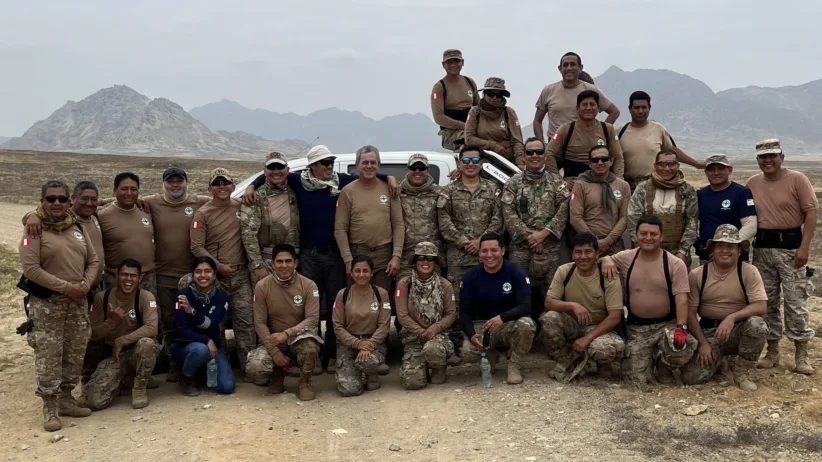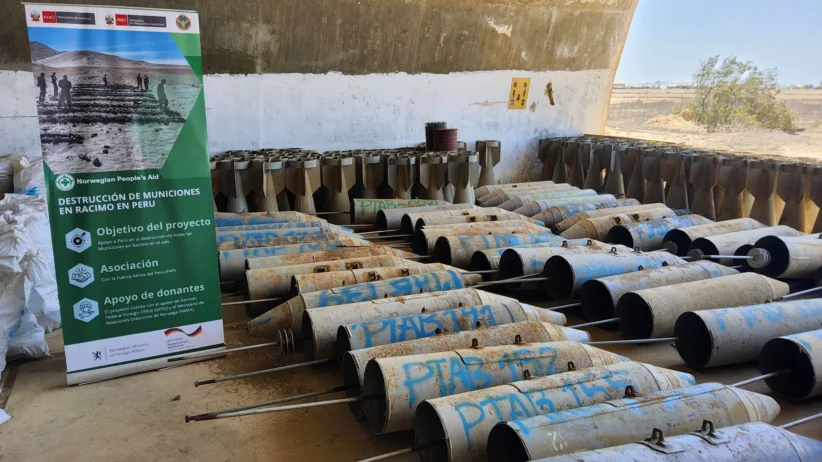Friday 15 December marked an important milestone for international weapons diplomacy as the last of Peru's cluster munition stockpiles went up in smoke at a military base in the south of the country. Not only was this the end of the road for Peru's cluster munitions stockpiles - it marked the completion of cluster munition stockpile destruction for all 112 states parties to the Convention on Cluster Munitions.
By Ingebjørg Sørenes
With the assistance of Norwegian People's Aid (NPA), the Peruvian Air Force (FAP) has had the job of demilitarising and destroying cluster munition stockpiles at six air bases in Peru. The work has taken almost ten years and is the most comprehensive cluster munition stockpile destruction project that NPA has ever undertaken. The organisation has assisted in dismantling, burning and detonating 2021 cluster munitions containing 155,591 submunitions.
After Slovakia, Bulgaria and South Africa got rid of their cluster munition stockpiles earlier this autumn, Peru was the last country remaining before all current state parties to the Convention on Cluster Munitions could declare that they have reached their goal.

"As we finish Peru’s stockpiles, the 112 States Parties to the Convention on Cluster Munitions have completed the destruction of nearly 1.5 million cluster munitions, containing 178.9 million submunitions, that could have posed a threat to civilians for many decades had they been used," said Deputy Secretary General of NPA, Per Nergaard.
Nergaard is clear that this milestone proves that international humanitarian disarmament treaties like the Convention on Cluster Munitions are effective and play an essential role in protecting civilians from weapons that cause unnecessary and indiscriminate harm. Signed by more than 100 governments in Oslo on 3 December 2008, the treaty prohibits all use, production, transfer and stockpiling of cluster munitions. Today the country has a total of 112 State Parties and 124 signatories.
"By fulfilling their commitments, these countries have contributed to a significant reduction in the number of explosive weapons globally resulting in a safer world. This is an important bright spot at a time when we are unfortunately witnessing an increase in the use of this obsolete type of weapon with unacceptable humanitarian consequences," he said.
Back in 2006 and 2007, Norway and Peru, together with a core group of four other governments, were some of the most important advocates for the ban on cluster munitions. The fact that all states have now reached their goal is a major victory for Norwegian and Peruvian diplomacy.
Peru's Ambassador to Norway, Gustavo Laurie, is grateful for the support from Norway and Norwegian People's Aid to Peru's compliance with obligations under International Humanitarian Law through joint efforts and a vision of a world free of cluster munitions.

"Given that Peru has never used these odious weapons, the destruction of the stockpiles means that Peru has fully fulfilled its most important obligations under the Convention on Cluster Munitions. Not the least does this mark an important milestone in the effort to bring the world one step closer to universalizing this important instrument of international humanitarian law," he said.
Humanitarian funding from the Governments of Norway and Germany have financed NPA’s efforts to assist the Peruvian Air Force with cluster munitions stockpile destruction in Peru.
Further reading: Bosnia and Herzegovina free of cluster munitions

- Norwegian People's Aid has assisted the Peruvian Air Force (FAP) in destroying Peru's cluster munitions stockpiles since 2014.
- The country had until April 1, 2024, to destroy all its cluster munitions stockpiles.
- The project has been funded by Norway and Germany
- It is the most extensive destruction of cluster munition stockpiles in Norwegian People's Aid's history.
- 2021 cluster munitions containing 155,591 submunitions stored at six different air bases in Peru have been destroyed.
- Peru’s stockpile contained seven different types of Cluster Munitions produced by the former Soviet Union, as well as some Spanish and South African types.
- The last 330 weapons were detonated at an air base in Pisco on Friday 15 December.
